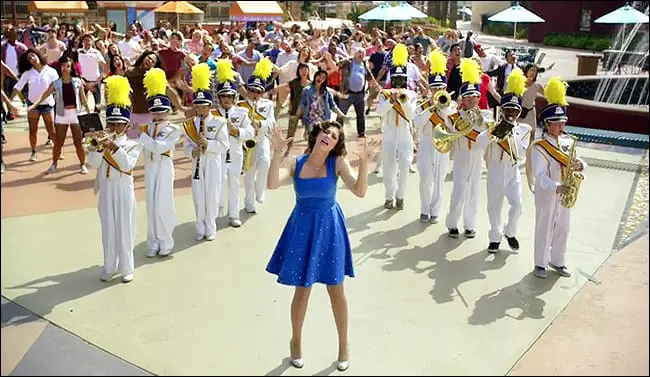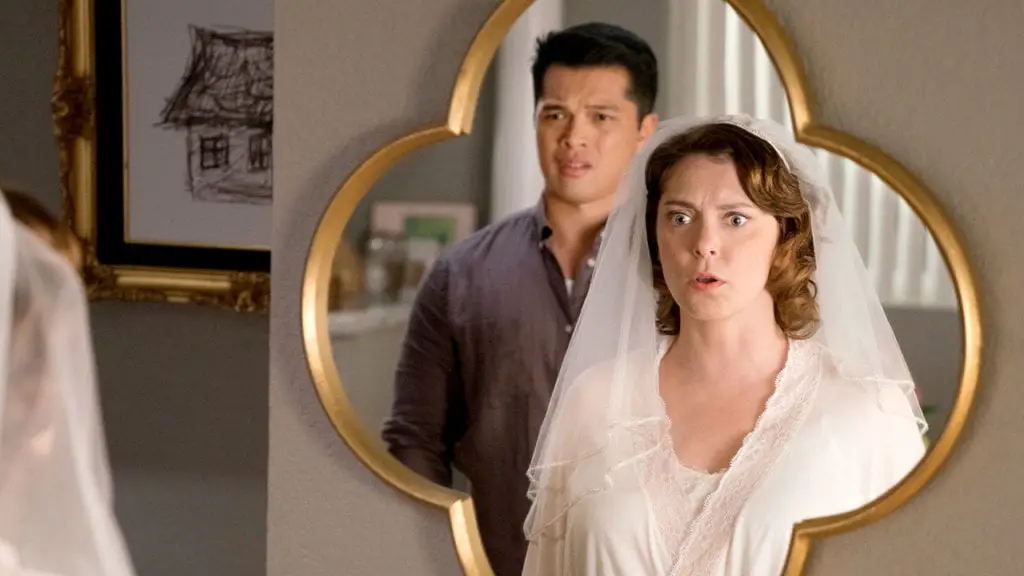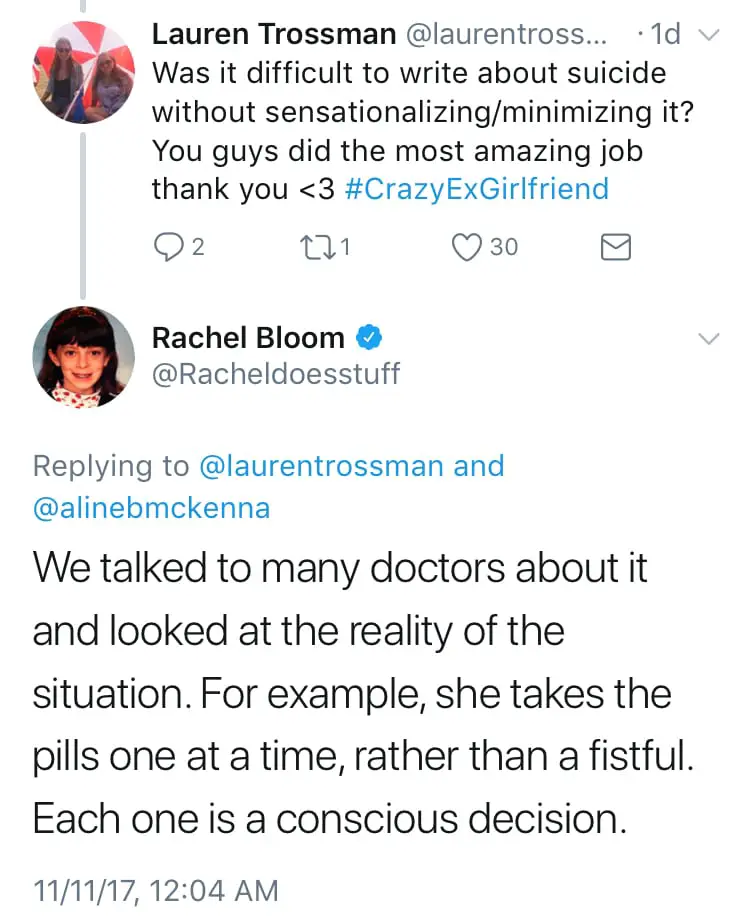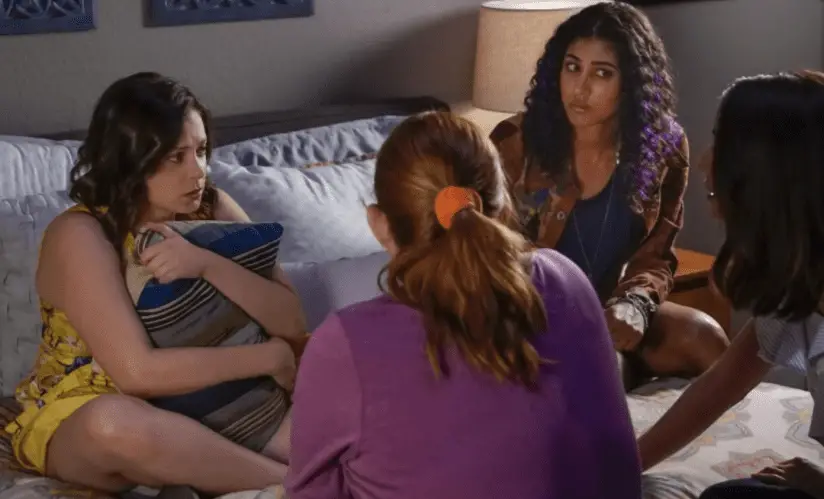Here at The Fandomentals, it’s not hard to tell when we begin to fall in love with a show. You may recall the windfall of Black Sails articles surrounding its series finale, our rather overzealous coverage of Supergirl a year ago, or the way Steven Universe creeps into every podcast we record. We dig in and frenetically try to explain exactly the reasons why you should be so enthused as well.
Then there’s shows like Crazy Ex Girlfriend, where I find myself unable to say anything at all, since it’s more or less perfect.
I know what I’m setting myself up for when I say this, because I’ve felt the let-down quite keenly many times before. That’s part of why I’ve been so hesitant to write anything at all. The other part is that I truly feel my explanations won’t do anything justice; watch it yourself and you’ll see what I mean.
Is Rebecca Bunch’s character the answer to my prayers for jewish women in media? Absolutely. Do we all need Paula Proctors in our life? You bet we do. Is this finally the bridge between musical theater, sitcoms, and dramatic TV? Without a doubt. Hell, it’s a show whose entire premise involves calling attention to the tropes and storytelling conventions we bemoan, and then digging in and flipping them on their heads. All of this I could easily write dissertation-length papers on, while feeling that none of it is adequately explaining what is so great here.
So it’s only now that Crazy Ex Girlfriend is tackling one of the most important issues in our society, and doing it with a remarkably skillful hand, that I’m forcing myself to write out my thoughts. Because honestly? It’s a shondeh if I don’t at least try to spread the love at this point.

As a warning, there will be spoilers for major plot beats through the most recent episode, 3×06 “Josh is Irrelevant.” Which sure, may be a weird way to convince people into watching something, but as I’ve articulated a few times…knowing what’s coming and what a show explores actually makes me more prone to dig into it. If you disagree, let me just leave you with this before you bow out: the “crazy” in the title of the show is exactly why I didn’t watch it for a couple of years. And boy was that a mistake, because it is so intentional, and exactly what’s being explored now in one of the most nuanced and validating ways possible.
Yup, showrunners Rachel Bloom and Aline Brosh McKenna are tackling mental health navigation and stigmatization. In the most recent episode, Rebecca Bunch receives a formal diagnosis (and even sings a song about getting one), and it’s made clear that all two and a half seasons were leading to this moment—not because of the diagnosis as an end in itself, but as a means to equip our character with the tools and understanding that empower her to push for a healthier state of mind. It is a show about a mentally ill woman lacking in traditional heroic qualities (dare I say antihero?). Yet instead of reveling in her moral greyness and watching her “oh my god” dissent, we are encouraged to actively empathize with her, and root for her to find balance. Because at its core, this show takes on a more positive view of humanity. We’re all just…trying to do okay with what we have, even if our weaknesses and anxieties can manifest in ways that hurt ourselves and those around us.
If that sounds interesting to you, watch the show. But for real now, explicit spoilers from here on out.
Rebecca Bunch was always meant to be a challenging character to the viewer. She makes an impulsive decision in the pilot episode to move to West Covina and pursue an old flame. Convinced this will make her instantly a happier person, she gleefully dumps her medicine down her garbage disposal (we’re unsure specifically what she took, though we do know anti-anxieties were in the mix) while whistling a merry tune. It’s clear this isn’t the healthiest thing you can do and she’s romanticizing the situation (and hilariously, the location as well).

At the same time, it’s also made clear that Rebecca truly was in an unhappy state in New York City, and her methods of coping through heavy medication and excessive work only fed into that. By midway through the first season, Rebecca tries to seek out a therapist to get new drugs, only to be told that she might actually need to explore her issues.
Rebecca: Those are the meds I was on in New York.
Dr. Akopian: Oh, my God. How did your body react to all this medication? You must not have been able to feel a thing.
Rebecca: Exactly. Numb as they come. So scribble scribble on your pizzle pad.
Dr. Akopian: Rebecca, your doctor in New York is a quack. He gave you a Band-Aid, not a cure. My method would be to do some digging and figure out what’s really going on inside your mind. And then we can discuss the appropriate medications.
Rebecca: So that’s great, but I need to be better by Monday.
The driving story continues to be about Rebecca’s quest for her fairy tale romance—a narrative that lives in her mind but not reality. Each romcom trope is broken down, from “unlikely suitor she actually falls for” (he turns out to be a fucking mess and leaves to be able to deal with his own issues in a healthy manner), to “the perfect prince who was always meant to be” (they both approach the relationship merely wanting to be in a relationship, without actually having a stable grasp on what they both need/want in life), to even the “screw men, we’ll just have a fun girl group and that’s enough” (Josh has a new girlfriend they need to stalk!).
However, it is always in the forefront that Rebecca is actively spinning the happenings in her life to fit whatever story she wants, all while resisting the core of what’s at her unhappiness.
Paula: Just let both of them go.
Rebecca: I don’t know who I am without them. I know that’s pathetic. I know it’s pathetic, but it’s true. Who am I supposed to be now?
Paula: Honey, be yourself.
Rebecca: What?! Who? No! Ew. Ugh! Who wants to be that?!
This becomes the most obvious when she enters into a relationship with Josh, but is not magically happier about everything. Rebecca very nearly has a breakthrough with Dr. Akopian to this point, only to be interrupted by Josh’s wedding proposal. Then from there, we get a tale as old as time: Rebecca stops feeling magical feelings about Josh, freaks out and kisses her boss in an elevator, freaks out from that and pushes their wedding date up to two weeks from that day, and then after not sleeping and going in full bridezilla mode, gets left at the altar because Josh begins to feel that he doesn’t truly know Rebecca. We also learn that Rebecca had previously wanted to marry another man in her past (Robert, a former professor of hers), but upon being broken up with by him, burned down his apartment and then was committed to a psychiatric institution for a time.

This is where Season 3 picks up, and in truth, I was very nervous about the Robert reveal. “Oh, so she really is ‘crazy’? That’s the point?” No. the point is that Rebecca is a troubled character who hasn’t received the help she’s needed. She has characteristics we all can relate to, from her self-deprecating thoughts to her struggle to feel ‘normal,’ even if we wouldn’t have necessarily made the same choices she did.
Season 3 shows her in crisis mode. Instead of confronting her insecurities, she lashes out at her friends, and even returns home to stay with her mother for a bit, despite their history with Naomi’s selfish and often inappropriate or harmful behavior. However, when her mom sneaks her anti-anxieties (out of fear of Rebecca wanting to commit suicide), Rebecca feels as though she has no one she can count on anymore, especially since she thinks she alienated everyone else. At the end of 3×05, Rebecca tries to commit suicide on a plane by taking a bottle full of anti-anxiety meds one a time, before telling the flight attendant that she needs help.
Other media has tried to depict suicide before, but it is so often done in a way that’s meant to shock, or even (distressingly) in a way that almost romanticizes the behavior. Hell, Life is Strange actually makes a student’s suicide a playable level, where if you’re just observant enough, you can stop it (for points!). Crazy Ex Girlfriend walked the impossible line of depicting the suicide attempt in a realistic manner—it was easy to track Rebecca’s feeling of hopelessness and isolation—without any sort of glamorization. She was in a rough, unhealthy state, and the audience was encouraged to root for that to change.

Better yet, Rachel Bloom and Aline Brosh McKenna made themselves available on Twitter immediately afterwards. That, in addition to a suicide helpline message which appeared on the screen following the episode, demonstrated that they were being as thoughtful as possible when approaching such a potentially triggering subject. It was difficult to watch, no question. But shying away from these topics doesn’t give equip us with the tools to handle them. We’ve praised Jessica Jones for starkly examining rape and rape apology; Crazy Ex Girlfriend is a show that should receive similar acclaim, particularly given how usual portrayals of suicide and mental health tend towards victim blaming.
Even that aspect was highlighted in the newest episode; Rebecca continually apologizes for the “hassle” she’s caused, and how bad she feels that everyone’s normal routine has been interrupted since like…her friends want to make sure she’s okay. It’s just so true-to-life. Too often our media has something *happen* to a character, and then it disappears an episode later. Rebecca’s deeply-felt self-loathing and general unworthiness isn’t gone just because her stomach was pumped, however. And that kind of consistency is important. Life doesn’t make narrative sense, so even though there’s a clear story that’s being told, it’s told in way that feels refreshingly familiar. Because it mirrors life.
Add to this the diagnosis. Rachel Bloom has talked openly about her own mental health numerous times. She also said this last week:

It’s clear this was written from a place of understanding, and with an attempt to be as validating and healing as possible. Rebecca sings a boisterous song about getting a diagnosis that will be her golden ticket to happiness (she’ll finally fit in somewhere), which amazingly captures the awareness of stigmatization alongside the often unreasonable weight people attached to their diagnoses. I just say this as a woman with OCD and general anxiety disorder, and I don’t want to speak for everyone ‘neurodivergent’, for lack of a better umbrella term. But in my opinion, the episode’s greatest strength was the way in which both of Rebecca’s doctors talked about her diagnosis. It’s not an identity, nor is it a fix; it’s a tool of understanding behavior, and one that can help guide treatment in a way that makes the most sense for her.
At the same time, Rebecca possesses the traits which define Borderline Personality Disorder. This was something I’ve said (mostly to Julia) for a long time, and something I’ve been scared for the show to tackle. I have intimate experience with this disorder, and without sugarcoating anything, some hurt as well. I have never seen proper depiction of it before this show, and I never in a million years thought it would actually be labeled, then fully described in a way that’s so accessible to an uninformed audience.
“A person with BPD is essentially a person that has difficulty regulating their emotions. Someone that lacks the protective emotional skin to feel comfortable in the world.”
It’s clear that Rebecca’s world is one that’s scary to be in. She never feels she fits, she has a terror of abandonment, and her impulsive actions that she does in order to control situations or feel accepted (be it breaking into Josh’s house to delete an embarrassing text, rushing to a wedding because she had a moment of doubt, or even sleeping with her ex’s dad because he was the only person being nice to her) have outcomes that usually result in more unhappiness. To be able to know that she’s not alone in this struggle is validating.

Though of course, and again realistically, the show doesn’t make the BPD simple or straightforward. Rebecca immediately Googles BPD and hates what she reads: that treatment can be lifelong, that there’s no “cure”, and even that 10% of people with BPD do kill themselves. She pushes against this diagnosis, even telling Dr. Akopian that she was bullied by the other doctor into agreeing with him on it, until Akopian whips out the DSM and goes through the checklist to see if Rebecca matches the criteria. Every point applies, and the show brilliantly provides flashbacks as these are read off. Rebecca sinks into despair, calling herself “certifiably crazy.”
Like…yeah. This is it. This is what happens. I was watching, half wanting to cry because of how easy it is to feel for Rebecca in that moment, and half wanting to laugh because finally what I’ve seen and experienced (second-handedly)—what I’ve even questioned and doubted—is on my screen for the first time, ever. We talk a lot about why fiction and representation matters, yet it’s almost unthinkable that the diagnostic process has been rarely been shown on our screens. Certainly not in this much detail.
The episode does end on a hopeful note, with Rebecca saying that she doesn’t want to ever feel like she did on the plane again. She goes to a group therapy, and gets a book to read afterwards. It’s not the end, nor was it ever meant to be. But it’s the means of getting her to a healthy place, and in that process, we see a lot of our own realities, from the hilarious to the uncomfortable.
That’s the story that matters, and that’s the story that was always being told. We’re just finally at the place where the characters see it too.

